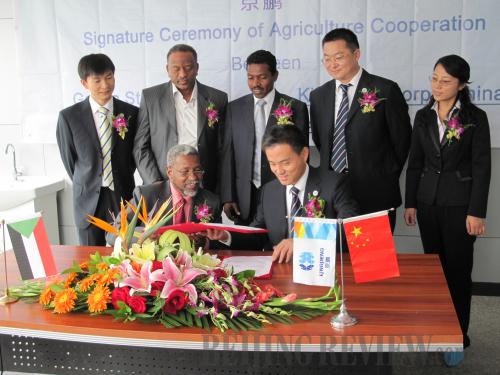|
|

|
|
EXCHANGE: Azhry Khalf Allah of Sudan signs a deal with Tian Zhen, CEO of Beijing Kingpeng Int. (COURTESY OF KINGPENG INT.) |
Trying to summarize the achievements of the FOCAC is a daunting task – there are so many across such a wide spectrum of fields. Perhaps looking at one striking example of this cooperation sums up the many practical developments made under the FOCAC banner.
One week after the China-Africa Agriculture Cooperation Forum on August 11-12, 2010, in northwest Beijing (a FOCAC spin-off event), a Sino-African cooperation agreement was reached in the field of greenhouse farming. Beijing Kingpeng International Hi-Tech Corp., a leading hi-tech greenhouse manufacturer in China, signed a contract with Al Jazirah State of Sudan for strategic cooperation in facility agriculture.
Specializing in industrialized agricultural equipment research, design and production, Kingpeng is expected to provide Sudan with advanced technology and equipment for greenhouse farming and cultivation. It is the company's first official contract on the continent, but for Zhu Yongwen, assistant to the general manager of Kingpeng, the cooperation is "just a starting point for the company's grand strategy in Africa."
Zhu is optimistic about the prospect of cooperation with the northeastern African nation. "Sudan has great potential for agriculture. Covering an area of 2.5 million square km, it has 84 million hectares of tillable land, but only 20 percent has been cultivated," she said.
She also believes the cooperation with Sudan is a win-win strategy. Besides helping Kingpeng to enhance profits and build its reputation overseas, such a move will greatly benefit Sudan both in a short and long term. "Our project will help create more jobs and improve the livelihood of local farmers. It will also help hasten Sudan's transition from low-tech agriculture to more ecologically sound agriculture. As a bonus, it will benefit other business sectors in the country," she said.
According to Zhu, negotiations and on-site investigation by both sides began at the end of 2009, but it was not until the China-Africa Agriculture Cooperation Forum in August, a follow-up to the Fourth Ministerial Conference of FOCAC, that the final deal was reached.
As a participant and witness of Sino-African cooperation herself, she felt the FOCAC mechanism is helpful and effective. "The forum has greatly enhanced cooperation," she said. "Since its establishment, there have indeed been more frequent bilateral exchanges than ever. Rather than some broad and abstract framework, FOCAC is very pragmatic."
Ten-year history
This year marks the 10th anniversary of FOCAC. China and 49 African countries jointly launched this new platform at its First Ministerial Conference in Beijing in October 2000. Since then, the conference has been held every three years and FOCAC continues to serve as a mechanism for bilateral dialogue and cooperation. The success of Kingpeng is just one example of the fruitful development of cooperation between China and Africa
Speaking at the welcoming banquet for the opening of FOCAC in 2000, Chinese Vice Premier Qian Qichen said, "It is an unprecedented event in the history of China-Africa relations, both in terms of its nature and the number of participating states, which not only shows the great vitality of the amicable relations between China and African countries, but also our strong desire and firm resolve to meet the challenges of the new century and create a better future."
At the Third FOCAC Ministerial Conference in 2006, Chinese President Hu Jintao proposed an eight-point plan to forge a new path for the China-Africa strategic partnership. The plan includes providing preferential loans, setting up a development fund, canceling debt, establishing economic and trade zones as well as other measures.
|